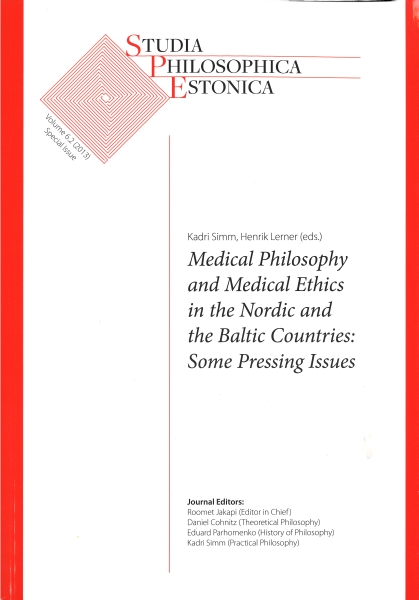Truth-telling and the Asymmetry of the Attitude to Truth-telling to Dying Patients in Latvia
DOI:
https://doi.org/10.12697/spe.2013.6.2.05Keywords:
truth-telling truthfulness, physicians, students, dying patientsAbstract
This article deals with concerns related to truth-telling in interaction between the doctor and the dying patient, exploring such issues as conflicting duties of veracity and non-maleficence, truthfulness and deception, and reasons behind physicians' decisions either to withhold or to disclose information about patients' diagnoses and prognoses. It focuses on various attitudes to truth-telling to dying patients, such as symmetry and asymmetry, both of which can be positive and negative. The empirical part of the article reports on the methods and results of the qualitative study carried out in Latvia during the summer of 2012. This study was based on the assessment of three case scenarios from the quantitative instrument designed by Dalla-Vorgia et al. in 1992. By means of semi-structured and focus-group interviews, evidence was gathered about physicians' and medical students' attitudes towards truth-telling, which allows the drawing of conclusions about the presence of asymmetry and symmetry in both cases. Additionally, an insight about the standards used for making decisions in case scenarios was gained and the origins of these standards were explored, revealing the aftermath of a gradual evolution from the ethics of the Soviet era to modern standards of medical ethics.
Downloads
References
Beauchamp, T. and Childress, J. (1994). Principles of biomedical ethics, 4th edn, Oxford University Press, Oxford.
Bok, S. (1999). Lying. Moral choice in public and private life, 2nd edn, Vintage Books, New York.
Carson, T. (2010). Lying and deception. Theory and practice, Oxford University Press, Oxford.
Collins, J. (2006). On telling patients the truth, in H. Kuhse and P. Singer (eds), Bioethics. An Anthology, Blackwell Publishing, pp. 605-610.
Dalla-Vorgia, P., Katsouyanni, K., Garanis, T., Touloumi, G., Drogari, P. and Koutselinis, A. (1992). Attitudes of a mediterranean population to the truth-telling issue, Journal of Medical Ethics 18: 67-74.
Hancock, K., Clayton, J., Parker, S., der Wal, S., Butow, P., Carrick, S., Currow,D., Ghersi, D., Glare, P., Hagerty, R. and Tattersall, M. (2007). Truth-telling in discussing prognosis in advanced life-limiting illnesses: A systematic review, Palliative Medicine 21: 507-511.
Higgs, R. (2006). On telling patients the truth, in H. Kuhse and P. Singer (eds), Bioethics. An Anthology, Blackwell Publishing, pp. 611-617.
Jotkowitz, A., Glick, S. and Gezundheit, B. (2006). Truth-telling in a culturally diverse world, Cancer Investigation 24: 786-789.
Katz, J. (1984). The silent world of doctor and patient, The Free Press, New York.
Noordzij, P., Poldermans, D., Schouten, O., Bax, J., Schreiner, F. and Boersma, E. (2010). Postoperative mortality in the Netherlands: A population-based analysis of surgery-specific risk in adults, Anesthesiology 115: 1105-1115.
Nuket, O. (2003). Truth-telling information and communication with cancer patients in Turkey, Journal of the International Society for the History of Islamic Medicine 2: 31-36.
Patton, M. (1990). Qualitative evaluation and research methods, Sage, London.
Shahidi, J. (2010). Not telling the truth: Circumstances leading to concealment of diagnosis and prognosis from cancer patients, European Journal of Cancer Care 19: 589-593.
Shahidi, J., Taghizadeh-Kermani, A., Yahyazadeh, S., Khodabakhshi, R. and Mortazavi, S. (2007). Truth-telling to cancer patients from relatives’ point of view: A multi-centre study in Iran, Austral-Asian Journal of Cancer 6: 213-217.
Shank, G. (2002). Qualitative research: A personal skills approach, Pearson, Upper Saddle River.
Sontag, S. (1990). Illness as metaphor and AIDS and its metaphors, Picador, New York.
Spiro, H. and Mandell, H. (1998). When doctors get sick, Annals of Internal Medicine 128: 152-154.
Sullivan, J., Menapace, L. and White, R. (2001). Truth-telling and patient diagnoses, Truth-telling and patient diagnoses 27: 192-197.
Tuckett, A. (2004). Truth-telling in clinical practice and the arguments for and against: A review of literature, Nursing Ethics 11: 500-513.
Veatch, R. (1989). Death, dying and the biological revolution, Yale University Press, New Haven.
Williams, B. (2002). Truth and truthfulness, Princeton University Press, Princeton.

